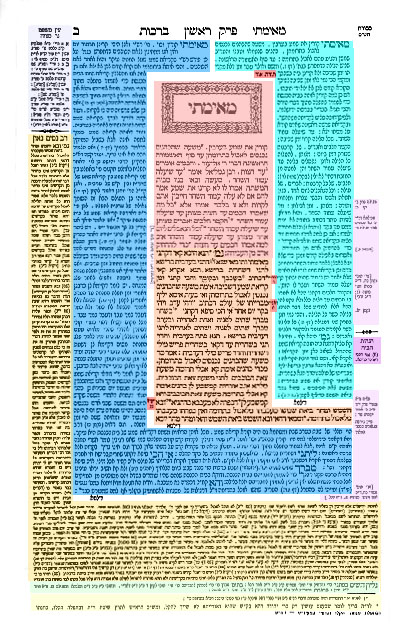
“Purpose” of women in the Talmud
-
To support their husband
-
To make a point (usually about a man)
-
To demonstrate why a specific halakhic (legal) rule exists (as the example or the one to explain)
-
To help a Rabbi perform an act (like death)
Characters
- Rabbi Meir. Considered one of the greatest Tannaim of his generation (139-163 CE). A Tanna (the singular of Tannaim) means he wrote during the time of the Mishna. Learned in both opposing schools of thought (that of Rabbi Akiva and Rabbi Ishmael). He was considered humble and kind. Married to Beruria
- Beruria. She is sometimes seen as a sage in terms of the Talmud, because she was learned and would be in Rabbi Meir's study hall. She is the daughter of Rabbi Haninah ben Teradyon and married to Rabbi Meir.
With regard to the statement of Rabbi Yehuda, son of Rabbi Shimon ben Pazi, that David did not say Halleluya until he saw the downfall of the wicked, the Gemara relates: There were these hooligans in Rabbi Meir’s neighborhood who caused him a great deal of anguish. Rabbi Meir prayed for God to have mercy on them, that they should die. Rabbi Meir’s wife, Berurya, said to him: What is your thinking? On what basis do you pray for the death of these hooligans? Do you base yourself on the verse, as it is written: “Let sins cease from the land” (Psalms 104:35), which you interpret to mean that the world would be better if the wicked were destroyed? But is it written, let sinners cease?” Let sins cease, is written. One should pray for an end to their transgressions, not for the demise of the transgressors themselves. Moreover, go to the end of the verse, where it says: “And the wicked will be no more.” If, as you suggest, transgressions shall cease refers to the demise of the evildoers, how is it possible that the wicked will be no more, i.e., that they will no longer be evil? Rather, pray for God to have mercy on them, that they should repent, as if they repent, then the wicked will be no more, as they will have repented. Rabbi Meir saw that Berurya was correct and he prayed for God to have mercy on them, and they repented.
§ The Gemara relates: Berurya, the wife of Rabbi Meir, was a daughter of Rabbi Ḥanina ben Teradyon. She said to Rabbi Meir: It is a disrespectful matter for me that my sister is sitting in a brothel; you must do something to save her. Rabbi Meir took a vessel [tarkeva] full of dinars and went. He said to himself: If no transgression was committed with her, a miracle will be performed for her; if she committed a transgression, no miracle will be performed for her.
Rabbi Meir went and dressed as a Roman knight, and said to her: Accede to my wishes, i.e., engage in intercourse with me. She said to him: I am menstruating [dashtana] and cannot. He said to her: I will wait. She said to him: There are many women in the brothel, and there are many women here who are more beautiful than I. He said to himself: I can conclude from her responses that she did not commit a transgression, as she presumably said this to all who come.
Rabbi Meir went over to her guard, and said to him: Give her to me. The guard said to him: I fear that if I do so, I will be punished by the government. Rabbi Meir said to him: Take this vessel full of dinars; give half to the government as a bribe, and half will be for you. The guard said to him: But when the money is finished, what shall I do? Rabbi Meir said to him: Say: God of Meir answer me! And you will be saved. The guard said to him: And who can say that this is the case, that I will be saved by this utterance? Rabbi Meir said to him: You will now see. There were these carnivorous dogs that would devour people; Rabbi Meir took a clod of earth, threw it at them, and when they came to devour him, he said: God of Meir answer me! The dogs then left him alone, and after seeing this the guard gave the daughter of Rabbi Ḥanina ben Teradyon to Rabbi Meir.
Ultimately the matter was heard in the king’s court, and the guard, who was brought and taken to be hanged, said: God of Meir answer me! They then lowered him down, as they were unable to hang him. They said to him: What is this? He said to them: This was the incident that occurred, and he proceeded to relate the entire story to them.
They then went and engraved the image of Rabbi Meir at the entrance of Rome where it would be seen by everyone, and they said: Anyone who sees a man with this face should bring him here. One day, Romans saw Rabbi Meir and ran after him, and he ran away from them and entered a brothel to hide. Some say he then escaped capture because he saw food cooked by gentiles and dipped [temash] this finger in the food and tasted it with that other finger, and thereby fooled them into thinking that he was eating their food, which they knew Rabbi Meir would not do. And some say that he escaped detection because Elijah came, appeared to them as a prostitute and embraced Rabbi Meir. The Romans who were chasing him said: Heaven forbid, if this were Rabbi Meir, he would not act in that manner.
Rabbi Meir arose, fled, and arrived in Babylonia. The Gemara notes: There are those who say that he fled because of this incident, and there are those who say that he fled due to embarrassment from the incident involving his wife Berurya.



